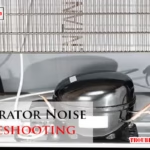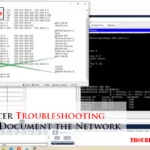You rely on your GE refrigerator every day to keep your food fresh and your drinks cold. But what happens when it starts acting up?
Suddenly, your kitchen routine is disrupted, and you’re left wondering what went wrong. Don’t worry; you’re not alone, and there are solutions at your fingertips. In this guide, we’ll walk you through simple troubleshooting steps that can help you identify and fix common issues with your GE refrigerator.
Whether it’s a mysterious noise, a temperature problem, or a sudden malfunction, you can take control of the situation and restore your fridge to optimal performance. Dive in to discover practical tips that will save you time, money, and a headache. Your refrigerator’s health is in good hands!
Common Refrigerator Issues
Facing common refrigerator issues with GE models can be frustrating. Frequent problems include cooling failures, water leaks, and strange noises. Simple troubleshooting steps can often resolve these issues quickly.
Is your GE refrigerator acting up? You’re not alone. Many owners face common issues that can disrupt daily life. Knowing what to expect and how to handle these problems can save you time, money, and stress. Let’s dive into some frequent challenges you might face and how to address them.Cooling Problems
One of the most annoying issues is when your refrigerator stops cooling properly. Imagine reaching for a cold drink, only to find it’s lukewarm. This might happen due to a blocked air vent or a malfunctioning thermostat. Check if something is obstructing the vents, like a food item pushed too far back. Sometimes, simply adjusting the temperature settings or cleaning the condenser coils can resolve the issue. Have you checked your settings lately?Strange Noises
Hearing odd sounds from your refrigerator can be unsettling. It’s like having an unexpected guest in your kitchen. These noises often stem from the fan or motor components. A rattling sound might indicate a loose part, while humming could be the compressor working overtime. Try pinpointing the noise’s origin. Tightening a screw or leveling the fridge might just bring you peace and quiet. Does your fridge sound like it’s auditioning for a horror movie?Water Leaks
A puddle around your fridge is never a welcome sight. It’s not just inconvenient; it can damage your flooring. Leaks often result from a clogged defrost drain or a faulty water inlet valve. Clear the drain with a mixture of warm water and baking soda to ensure smooth flow. Regularly inspecting the water line connections can also prevent future leaks. Have you noticed any small drips or persistent moisture? Addressing these issues proactively can extend the life of your GE refrigerator and maintain your peace of mind. Whether it’s cooling problems, strange noises, or water leaks, knowing what to look for is half the battle. Do you feel more prepared to tackle these challenges?
Credit: www.handyguyspodcast.com
Quick Fixes For Cooling Problems
GE refrigerators are known for their reliability. Yet, cooling issues can arise. Quick fixes can often resolve these problems. Let’s explore some easy solutions. These fixes may help your fridge cool efficiently again.
Adjusting Temperature Settings
The right temperature keeps food fresh. Check the settings on your fridge’s control panel. Ensure the fridge is set between 35°F and 38°F. The freezer should be around 0°F. Adjust if necessary. Wait 24 hours to see changes.
Checking Door Seals
Door seals prevent warm air from entering. Inspect the seals for gaps or damage. Close the door on a piece of paper. If you can pull the paper out easily, the seal may need repair. Replace seals if worn out.
Cleaning Condenser Coils
Dusty coils affect cooling. Locate the coils behind or beneath the fridge. Unplug the fridge before cleaning. Use a vacuum or brush to remove dust. Clean coils improve efficiency. Try cleaning them every six months.
Addressing Strange Noises
Strange noises from your GE refrigerator can be unsettling. Understanding their source is key. These sounds might indicate a minor issue. Or, they could signal something more serious. Addressing them promptly ensures your fridge runs smoothly. Let’s explore some common noise causes.
Identifying The Source
First, identify where the noise comes from. Is it inside the fridge? Or perhaps from the back? Listen closely to pinpoint the area. Different parts can make distinct sounds. The fan might hum. Shelves might rattle. Knowing the source helps in fixing the issue.
Leveling The Refrigerator
A tilted fridge can cause strange noises. Check if your fridge is level. Use a spirit level for accuracy. Adjust the legs to ensure even balance. This simple step can reduce unwanted sounds. It also improves the fridge’s performance.
Inspecting The Compressor
The compressor might be the noise culprit. It sits at the back of the fridge. Listen for loud humming or buzzing. These could indicate a compressor problem. Ensure it’s clean and free of dust. A clean compressor works better and quieter.
Solving Water Leak Issues
Experiencing water leaks from your GE refrigerator? Check the water line connections and defrost drain for clogs. Ensuring these areas are clear can help resolve the issue quickly.
Experiencing a water leak from your GE refrigerator can be both frustrating and alarming. Addressing this issue promptly is crucial to maintaining your appliance’s efficiency and preventing further damage. Let’s dive into some practical solutions to tackle water leak issues, and get your refrigerator back to top performance.Examining Water Lines
Start by checking the water lines. A loose or damaged connection can easily lead to leaks. Ensure that all connections are tight and there are no visible cracks in the lines. You might need to replace a damaged line. A simple fix like this can save you from bigger problems down the road. Have you ever replaced a water hose? It’s straightforward and can be a rewarding DIY task.Clearing Drainage Systems
A clogged drainage system can cause water to pool and leak. Check the drain tube for blockages. Over time, debris can accumulate and obstruct the flow. Clean the drain tube with a mixture of baking soda and vinegar. This natural solution can dissolve minor clogs effectively. Regular maintenance can prevent future blockages.Inspecting The Ice Maker
The ice maker can also be a source of leaks. Inspect the water supply to the ice maker. Ensure connections are secure and there are no kinks in the tubing. Look for any signs of ice buildup around the ice maker. This could indicate a leak that needs attention. Is your ice maker overfilling? Adjust the water level, as it might be set too high, causing overflow. By addressing these areas, you can often resolve water leak issues quickly and efficiently. Your GE refrigerator deserves the best care, and with a little attention, it will continue to serve you well. Have you tackled a leak before? Share your experience and any tips you found helpful.Maintenance Tips
Experiencing issues with your GE refrigerator? Check for blocked vents or dirty coils. Ensure door seals are tight. Regularly clean and inspect for optimal performance.
Maintaining your GE refrigerator is essential to ensure its longevity and efficiency. A well-maintained appliance can save you money on repairs and keep your food fresh. Here are some practical maintenance tips to keep your refrigerator running smoothly.Regular Cleaning
Cleanliness is crucial for your refrigerator’s performance. Dust and debris can accumulate on the coils, making your fridge work harder. Unplug your refrigerator and clean the coils every six months using a vacuum or a soft brush. Don’t forget the interior. Wipe down shelves and drawers with a mild soap solution to prevent odors and bacteria. A clean refrigerator not only looks good but also operates more efficiently.Proper Loading Techniques
How you load your refrigerator can affect its cooling performance. Make sure air can circulate freely around your food items. Overloading can block vents and lead to uneven cooling. Place items strategically. Store raw meat on the bottom shelf to prevent juices from dripping onto other foods. This not only keeps your fridge tidy but also ensures food safety.Checking For Wear And Tear
Regularly inspect your refrigerator for signs of wear and tear. Check door seals for cracks or gaps, as these can let cold air escape and increase energy consumption. A simple dollar-bill test can help: close the door over a bill, and if it pulls out easily, the seal may need replacing. Listen for unusual noises. Strange sounds can indicate a problem with the motor or fan. Addressing these issues early can prevent more significant problems down the line. Have you ever considered how small actions can impact your appliance’s efficiency? Consistent maintenance might seem tedious, but it pays off in the long run. Implementing these tips can help you avoid unexpected breakdowns and ensure your GE refrigerator serves you well for years to come.
Credit: nappliancerepair.ca
When To Call A Professional
Refrigerators play a crucial role in keeping food fresh. When they malfunction, it disrupts daily life. Some issues are easy to fix. But certain problems require professional help. Knowing when to call a professional is important. It saves time and prevents further damage.
Identifying Complex Problems
Some refrigerator problems are hard to diagnose. If you hear strange noises or see leaks, it might be serious. Electrical issues can also be risky. These problems need expert attention. A professional can identify and fix complex issues safely.
Understanding Warranty Coverage
Check your refrigerator’s warranty before seeking repairs. Many GE refrigerators come with coverage. This might cover certain repairs or replacements. Knowing your warranty saves money. It also ensures you get the right service. Sometimes, professional repair is required to maintain the warranty.

Credit: www.youtube.com
Frequently Asked Questions
How Do I Reset My Ge Refrigerator?
Find the reset button near the control panel. Press for 10 seconds. It should reset.
Why Is My Ge Fridge Not Cooling?
Check the temperature setting. Ensure vents are not blocked. Clean the condenser coils for better cooling.
What Does Ge Refrigerator Error Code Mean?
Each code indicates a specific issue. Refer to the user manual for code meanings and troubleshooting steps.
How Do I Fix Ge Fridge Water Dispenser?
Check the water filter. Replace if clogged. Ensure water supply line is connected and not kinked.
How Often Should I Defrost My Ge Refrigerator?
Defrost once every six months. Helps maintain efficiency. Prevents ice buildup. Keeps the fridge functioning well.
Conclusion
Fixing a GE refrigerator can be simple. Start with the basic checks. Ensure the power is on. Look for any tripped circuits. Examine the temperature settings. Clean the coils regularly. Check the seals on the doors. A tight seal prevents leaks.
Listen for unusual noises. They can signal problems early. For persistent issues, consult the manual. It provides detailed instructions. Call a professional if needed. Regular maintenance keeps your fridge running smoothly. Understanding these steps saves time. Keep your refrigerator in top shape.
It lasts longer and works better.






